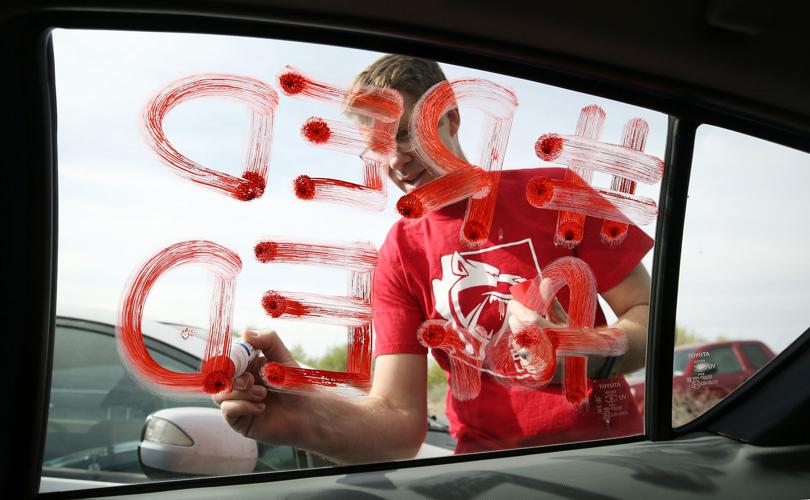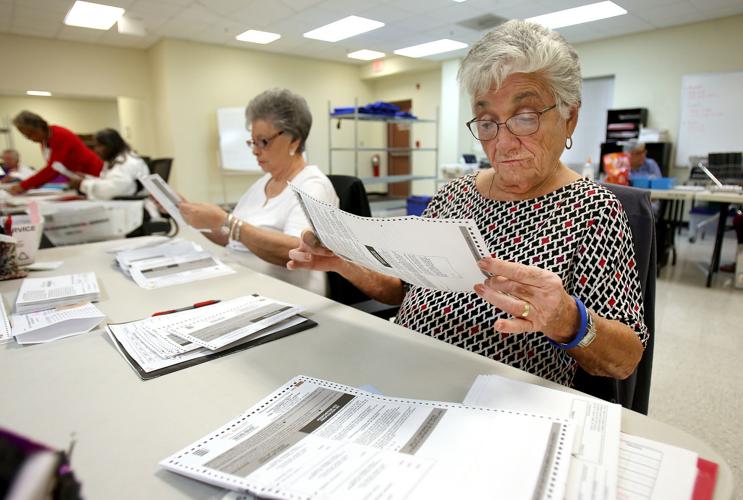After Pima County voters last year rejected most local school funding measures, Tucson-area school districts are cautiously eyeing this November’s ballot, hoping the #RedForEd movement and surging public support for education funding will help push their bonds and overrides to victory.
Four of Tucson’s major school districts are asking voters to approve bonds and/or overrides in November — local financing mechanisms used to pay for everything from art teachers and all-day kindergarten, to putting up new security fences and building new schools.
But school officials also worry that the push for education funding could work against them — that with several other education questions likely to be on the ballot, voters will have education-funding fatigue and will again shoot down attempts for local school districts to bond or approve override continuations.
Bonds and overrides are mechanisms by which voters can supplement their local school district’s budget. Both bonds and overrides come from increased property taxes, though all the proposed overrides in Pima County are merely extensions of existing overrides and would not increase property taxes.
Bonds are used to pay for one-time infrastructure projects, while overrides are for ongoing expenses.
Calvin Baker, superintendent of the Vail School District, which is seeking a $61 million bond to build two new schools and pay for other capital upgrades, said he was as shocked as anyone to see four out of five local school district bonds and overrides fail at the polls last year.
“It was a huge mystery,” he said.
Baker suspects the plethora of other ballot questions — a measure to raise sales taxes, along with several county and city bonding questions — led voters to take a strong anti-tax stance last year. And he worries that the recent boon in state funding to provide teacher raises, along with the possibility of the ballot containing the “Invest in Education” initiative, which seeks to tax the wealthy for education funding, could have the same effect.
“Maybe people will think, ‘We already gave them money,’” he said.
This year’s ballot will also likely contain requests from both the city and county for more bonds. The city is expected to seek a $225 million bond for parks, while the county has asked for $430 million for roads.
And if voters again feel they’re taxed enough already, Baker worries those other bonds could drag down local school bonds and overrides.
But Vail commissioned a poll of 300 likely voters in the district that showed voters are more likely to support increased education funding after the #RedForEd movement.
“In a way that makes sense,” Baker said. “People like to cheer for the winning team and right now education is winning. And the winning team doesn’t just need new uniforms, they might also need a stadium to play in.”
In fact, Vail’s $61 million bond, which would cost homeowners $74 per year per $100,000 of assessed value, would build two new schools — one high school and one middle school — as well as expand an existing high school. The bond would also help pay for basic repairs, like fixing up restrooms and carpeting.
Vail’s high schools are already overcrowded and the district estimates that within five years it will be roughly 25 percent over capacity. Vail’s middle schools are near capacity.
Already, the district has had to make creative use of its buildings to house its students.
“For example, at Cienega High, we have put three classrooms in the library, we have converted two teacher workspaces into classrooms and we’ve taken other classrooms and divided them into two separate classrooms. We’ve just been pushing everything we can to squeeze as much space utilization out of every campus,” Baker said.
SAHUARITA
Manuel Valenzuela, superintendent of the Sahuarita Unified School District, which is seeking a continuation on its existing 14 percent override that brings in $4.4 million per year, said he was also concerned that voters would conflate the new state money to provide teacher raises with the override.
The Sahuarita override pays for fine arts classes — like music, band and orchestra — and it ensures that middle- and high-schoolers don’t have to pay to sign up for sports. It’s also used to support the district’s career and technical education program. And perhaps most importantly, it pays for more than 100 full-time positions in the district, ranging from physical education teachers to school counselors to coaches.
“The mere sound of the word ‘override’ has a connotation that conveys a message perhaps that the organization is asking to go beyond its budget. It kind of resonates like you’re not able to stay within your budget, which is not the case. It’s actually supplemental local funding beyond state support, which has been significantly cut,” Valenzuela said.
Overrides are on seven-year schedules, but after the fifth year, districts start losing a third of the money. If the override fails this year, Sahuarita still has one more year to reauthorize it before it starts losing funding.
But if that funding isn’t reauthorized, the district will have to make hard decisions about where to cut, Valenzuela said.
“They’re unique programs that I believe, and the community believes, are important for a well-rounded education, but that, absent this investment, would be difficult to offer, given the cuts we’ve sustained over the last 10 years,” he said.
CATALINA FOOTHILLS SCHOOL DISTRICT
Catalina Foothills School District’s longstanding 13.3 percent override, which brings in $3.6 million annually, isn’t targeted to any specific programs or position, but rather is mixed in with its general funding and supports all schools, said Assistant Superintendent Denise Bartlett.
Catalina Foothills’ override is set to wind down in the 2019-2020 school year, at which point the district would start losing money if an override doesn’t pass before then.
“We would have to reduce staffing across the board, in all grade levels, probably, and that would increase class sizes. Then we’d have to look program by program to see which ones are viable and which are less viable,” she said.
TANQUE VERDE Unified SCHOOL DISTRICT
Tanque Verde Unified School District is seeking a $15 million bond for basic safety upgrades after an audit found that several of its schools lacked security measures, such as full and appropriate fencing and the ability to easily lock down campuses. That bond would increase property taxes in the district by $66 per $100,000 of assessed value.
The money would also go toward replacing “portable classrooms” — essentially trailers — with proper school buildings.
Additionally, the bond money would be used to replace classroom technology — like 10-year-old projectors — old buses, broken air-conditioning units and leaky roofs.
“It’s nothing super fancy at all. It’s safety and security, replacing things that are falling apart, ensuring we have appropriate classroom spaces and addressing some really old technology,” said Superintendent Scott Hagerman.
Tanque Verde is also asking voters to continue its 15 percent override, which brings in $1.7 million annually and supports librarians, music teachers, physical education teachers, art teachers and registered nurses in every school.
“If that override wasn’t in place, we would have to start going through to figure out strategic ways to find $1.7 million. And it would take away the things that parents and kids talk about that’s important in our schools, and what makes us us,” he said.
Hagerman said he learned from last year’s bond and override failures that crafting and selling the message is important.
“You have to be very careful about what you ask for, and you have to be really clear about why it’s needed,” Hagerman said.
“Every district is unique, so there may be some Arizona climate issues, or Pima County issues (that impact the outcome). But then there’s just to what degree are you doing things that your specific community wants. I think that’s why some pass and others don’t.”





